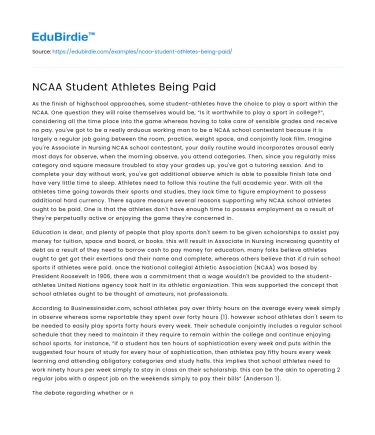Introduction
The debate over whether NCAA student-athletes should be paid has escalated over the past decades, attracting significant attention from academics, policymakers, and the general public. Traditionally, college athletics have been viewed as amateur sports, with student-athletes receiving scholarships as their principal reward. However, as the commercialization of college sports has intensified, generating billions of dollars annually, the call for compensating athletes has grown louder. Advocates argue that student-athletes deserve a share of the revenue they help generate, while opponents contend that paying athletes could undermine the educational mission of universities. This essay explores the multifaceted arguments surrounding the issue, examining the ethical, economic, and educational dimensions involved in compensating NCAA athletes. The analysis will include specific examples and counterarguments to provide a comprehensive understanding of this contentious topic.
Economic Implications of Compensating Athletes
The economic ramifications of paying NCAA student-athletes are substantial and multifaceted. The NCAA, a non-profit organization, reported nearly $1 billion in revenue in 2019, primarily from media rights and ticket sales (NCAA, 2019). Proponents of compensating athletes argue that these figures reflect the immense financial contribution of student-athletes to their universities and the NCAA structure, justifying the need for financial remuneration. For example, the University of Alabama's football program generated over $164 million in 2020, with none of these earnings directly benefiting the athletes (ESPN, 2020). This disparity raises questions about fairness and equitable distribution of resources.
Save your time!
We can take care of your essay
- Proper editing and formatting
- Free revision, title page, and bibliography
- Flexible prices and money-back guarantee
However, the economic argument against paying athletes centers on the potential financial strain on universities. Critics argue that only a few athletic departments are profitable, and paying athletes could lead to budget cuts in other academic areas. Moreover, there is a concern that a compensation model could lead to an imbalance among different sports and divisions, further complicating the NCAA's governance. A study by the Knight Commission on Intercollegiate Athletics found that most Division I programs operate at a loss, underscoring the financial impracticality of compensating athletes at all levels (Knight Commission, 2021). Thus, while the economic benefits for athletes are clear, the feasibility remains contentious.
Ethical Considerations in Athlete Compensation
The ethical dimension of compensating NCAA athletes is often framed around the concepts of fairness and exploitation. Advocates for paying athletes argue that the current system exploits students by profiting from their labor without direct compensation. The "amateurism" model is criticized for being outdated and unjust, especially since athletes risk career-ending injuries without financial security. For instance, former NCAA basketball player Ed O'Bannon's lawsuit against the NCAA highlighted how athletes' likenesses were used in video games without compensation, leading to a $60 million settlement for affected athletes (O'Bannon v. NCAA, 2014).
Conversely, opponents claim that student-athletes already receive significant benefits in the form of scholarships, housing, and educational opportunities. They argue that these benefits represent a fair exchange for their contributions to college sports. Furthermore, there is a concern that a payment system could shift the focus from education to athletics, compromising the academic integrity of universities. According to Mark Emmert, NCAA President, maintaining the educational mission is crucial, as "college sports are a part of a holistic educational experience" (Emmert, 2019). Thus, the ethical debate hinges on balancing fair compensation with preserving the educational values of collegiate sports.
Educational Impact and Counterarguments
The educational impact of compensating NCAA athletes is a critical factor in the discussion. Critics argue that paying athletes could disrupt the traditional model of collegiate sports, emphasizing financial gain over educational development. They warn that payment could lead to professionalization, where athletes prioritize sports over academic achievement, potentially diminishing graduation rates and academic standards.
On the other hand, advocates assert that compensating athletes could enhance their educational experience by alleviating financial stress, allowing them to focus more on academics without the pressure of financial insecurity. Furthermore, the recent implementation of Name, Image, and Likeness (NIL) rights has shown that athletes can benefit financially without compromising their educational commitments. According to a study by the National Bureau of Economic Research, NIL rights have not negatively impacted academic performance, suggesting that financial compensation and education can coexist (NBER, 2021).
The transition to a compensated model for NCAA athletes requires careful consideration of these educational implications. While the counterarguments present valid concerns, the evidence suggests that with proper regulation, compensating athletes could be beneficial without undermining educational objectives.
Conclusion
In conclusion, the debate over compensating NCAA student-athletes is characterized by complex economic, ethical, and educational considerations. While the financial contributions of student-athletes to the NCAA and universities are undeniable, the feasibility and fairness of a compensation model remain topics of contention. Ethical arguments highlight the need to address exploitation, while educational concerns emphasize the importance of maintaining academic integrity. Despite these challenges, the evolving landscape of college sports, marked by the introduction of NIL rights, suggests that a balanced approach to compensating athletes is possible. Ultimately, any policy change must carefully weigh the benefits of financial remuneration against potential impacts on the educational mission of collegiate sports. As this debate continues to evolve, it remains imperative for stakeholders to engage in informed discussions that prioritize the well-being and development of student-athletes.






 Stuck on your essay?
Stuck on your essay?

